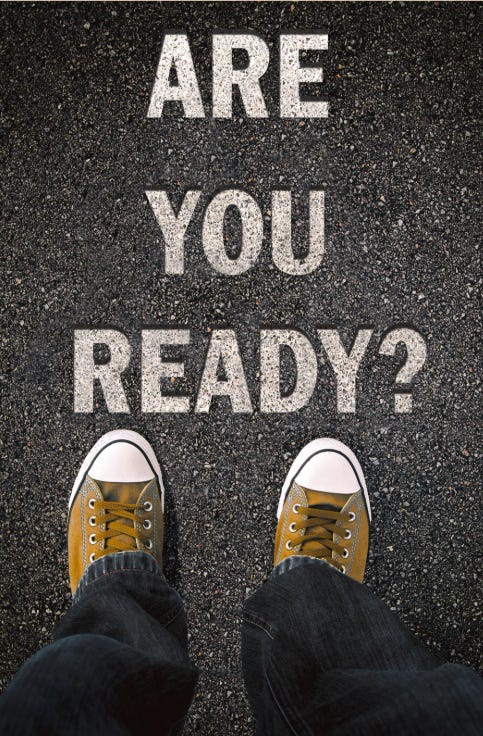Am I Ready for This Role?
It’s one of the most common — and most private — questions I hear from ambitious professionals:
“Am I really ready for this?”
Sometimes it’s whispered before a big interview.
Sometimes it’s asked in a moment of quiet self-doubt after a promotion.
Sometimes it’s the internal dialogue we battle with right before we say “no” to an opportunity we secretly wanted.
If this is the question sitting in your mind right now, I want you to hear this:
You are probably more ready than you think.
What “Ready” Really Looks Like
We’ve been conditioned to believe that readiness is a checklist.
That it’s about ticking every box, having every answer, and never feeling uncertain.
But in 20+ years of supporting high-performing professionals and emerging executives, I’ve found something very different:
The most impactful leaders don’t wait until they feel ready.
They move while they’re still becoming.
They say yes before their nervous system catches up.
Because readiness, it turns out, isn’t about certainty — it’s about capacity.
Your capacity to:
Learn quickly
Stretch into new ways of thinking
Hold space for discomfort without shrinking
Trust your voice — even when it trembles
Make decisions when there is no clear path forward
That’s real readiness. And it’s far more valuable than any resume line or certification.
And yet, many people stay stuck in the waiting room of their own potential, hoping someone will confirm what they’re too afraid to claim:
That they’re ready now.
The Real Question Behind “Am I Ready?”
When people ask me this question, it’s rarely about qualifications.
What they’re really asking is something deeper:
Will I fail?
Will I disappoint someone?
Will I be exposed as not good enough?
That’s not a readiness issue.
That’s fear.
That’s imposter syndrome.
That’s a lifetime of messaging that told you to play it safe, stay small, or wait until you were perfectly prepared.
Here’s where neuroscience offers a deeper insight: your brain is wired for self-preservation, not self-actualization. The amygdala (your brain's threat detector) fires when you step outside your comfort zone, even if it's a good thing. It registers "new" as "dangerous."
So when you feel the hesitation rise? That’s not proof you aren’t ready. That’s your brain trying to keep you safe.
Growth doesn’t wait for perfect.
And opportunities don’t always knock twice. The people who rise in their careers aren’t always the most qualified — they’re the most willing.
They’re willing to:
Step forward while still uncertain
Take on challenges without guarantees
Trust that who they are is enough
They understand something most people miss: readiness isn’t a feeling — it’s a decision.
5 Signs You’re More Ready Than You Think
If you're still not sure, here are five signs you're probably more ready than you're giving yourself credit for:
1. You feel uncomfortable — but curious.
That stretch you’re feeling? That’s capacity expanding. Readiness often shows up as butterflies, not confidence.
2. You see the gaps — and still show up.
Executives and changemakers aren’t fearless. They’re willing. You don’t need all the answers. You just need to be willing to go get them.
3. You’ve already outgrown where you are.
If your current role feels tight or uninspiring, that’s not a problem — that’s a signal. You’ve evolved. Your environment hasn’t caught up.
4. You’ve done hard things before.
Look back. You’ve navigated pressure, conflict, risk, and change before. This is just another opportunity to prove what you’re capable of.
5. You feel fear — but you’re not frozen.
Fear doesn’t mean stop. It means pause, breathe, and choose courage anyway. If you’re still thinking about what’s possible, you haven’t given up. That matters.
If even one of these resonates, I promise you: You’re closer to ready than you realize.
A Note on Confidence
Confidence isn’t something you wait for.
It’s something you uncover.
It’s what rises when you show up, again and again, with clarity, presence, and self-trust.
And yes — that, too, is backed by neuroscience. Confidence is a byproduct of neuroplasticity — the brain’s ability to rewire itself through experience and repetition. The more you practice courageously stepping forward, the more your brain begins to associate unfamiliar situations with capability, not danger.
It doesn’t always look like bold speeches or loud certainty.
Sometimes, confidence is quiet.
It looks like:
Taking the interview anyway
Speaking up in a room where your voice shakes
Submitting the application
Asking for the meeting
Saying yes to the opportunity that scares you a little (or a lot)
Confidence doesn’t always feel big — sometimes it’s the small decision to keep going.
So many capable, talented, high-potential professionals talk themselves out of the very opportunities they’ve earned — simply because they’re waiting to feel ready.
Let me be clear: Confidence is not about knowing everything.
It’s about believing you can figure it out.
That belief? That’s the game-changer.
Final Word: Lead Like It’s Already Yours
If you’re reading this and wondering whether you’re ready — that means you care.
That means you’re thoughtful.
That means you’re paying attention to your impact.
And that means you’re probably more ready than you think.
You don’t need to wait for perfection.
You don’t need to wait for another credential.
You don’t need to wait for someone to tap you on the shoulder.
You just need to start showing up like the role is already yours.
Because when you lead like you belong in the room, people start to see you that way, too.
So say yes.
Step in.
Let your presence make the case.
You’ve got this.
If this article resonated with you and you would like to learn more, I invite you to check out Overcoming Imposter Syndrome, a powerful, neuroscience-informed experience for high-achieving leaders ready to understand the root of self-doubt and step into unshakable confidence. It’s a 1 hour experience for a mind-blowing shift in perspective. (Did I mention it’s FREE?)






